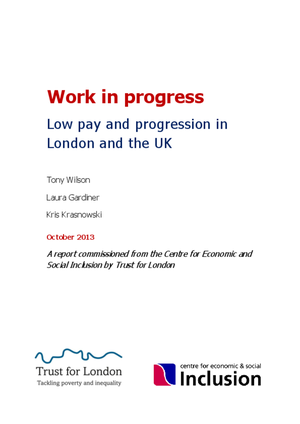1 in 7 London Workers Stuck in Low Pay for Over a Year. 570,000 Londoners, equivalent to one in seven London workers, have been stuck in low pay for at least a year, new research has found. The Work in Progress project, commissioned by Trust for London from the Centre for Economic and Social Inclusion, brings together new analysis on low pay and progressionat work.
It finds that around one third of low-paid workers see their wages increase by less than the national average, pointing to challenges with Universal Credit as its successful implementation depends on over a million low-paid workers increasing their earnings. Other key findings include:
- There are 14 occupations in London where a majority of staff are paid below the Living Wage – including sales staff, bar staff, waiters and labourers.
- All but two of these occupations have seen below average pay growth over the last five years.
- At the same time, employment in low paying occupations has grown – in some cases by more than a third. Low pay appears to be becoming more prevalent and entrenched.
- Low-paid young Londoners are more than twice as likely to see below average pay rises as low-paid young people in the UK as a whole.
- A survey of one hundred employment and skills providers finds that there is virtually no support from mainstream programmes to help low-paid workers progress – despite two-thirds of providers considering it to be very important or fundamental to participants
There is emerging evidence of what works in improving pay and progression:
- Low-paid workers receiving training on the job see their pay increase by 13% on average – two-thirds higher than those that don’t (8%)
- Supporting people to stay in work – through mentoring, personalised support and financial incentives – as has been shown in programmes in Canada and the United States
- ‘Business to business’ help for employers to retain and grow their workforce – as is being trialed through the new ‘Employer Ownership of Skills’ pilots
- Building career ladders within industries.
Recommendations from the report include:
- Unlocking the £2 billion Adult Skills Budget – with eligibility for full funding for Level 2 training extended to those in work and identified as most at risk of low pay and poor progression. Currently this funding cannot be spent on supporting low-paid workers.
- The development of a new ‘Employment Plus’ model, that combines support to find work, stay in work and progress in work. This approach should be incorporated into any successor to the Government’s Work Programme.
- London should take the lead in developing this model – through Jobcentre Plus as a starting point.
- An open source Innovation Fund to rigorously test new approaches to improving retention and progression, evaluate them and share the results.
- That London should develop its own framework to test and evaluate progression, within its existing contracts and programmes.

10 October 2013